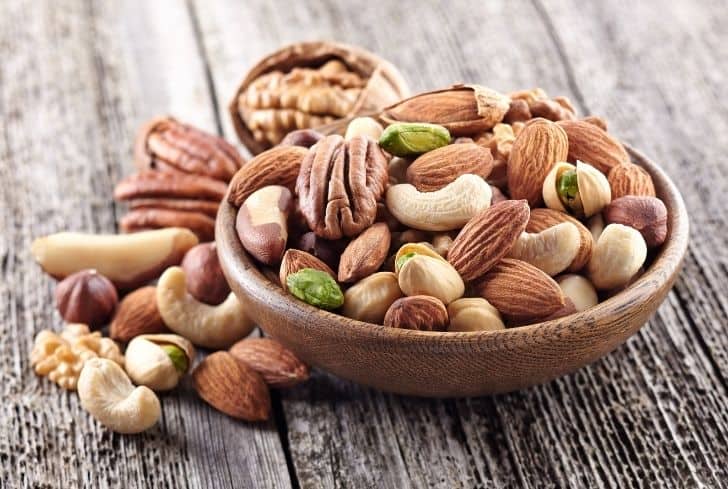Nuts are highly nutritious, and there’s such a range that accommodates our different tastes. There are over forty different nuts, so you have other options to choose from, even if you don’t like a particular type.
Composting is an all-natural and cheap means of providing fertilizers for plants. It’s also a uniform way of disposing of kitchen waste; all the kitchen waste for a particular community goes in the same bin and subsequently into a uniform compost pit. You can also choose to compost your own kitchen waste in your garden.
Now, if you have bought a ton of nuts and can’t seem to finish them all, or you don’t know what to do with the shells, then you’ll be amazed by just how beneficial they are for plants and the soil.
This article will answer all your questions on nuts, the compostable types and provide more explanations on how nuts benefit the soil.
Are Nuts Compostable?
Any compostable material is capable of decay, and within a short time too. However, there are certain conditions. You see, typically, kitchen waste is compostable, but we don’t recommend that you compost all your waste.
Some food wastes have intense aromas that can attract rodents and pests to your compost pile, and in their search for these foods, they can upheave everything you’ve composted. Now, that wouldn’t be a pleasant sight, and you’d have to spend time burying these compost materials back.
Not only would these pests upheave the compost materials, but they may tackle your plants too. These foods can invite pests to come and make a mess of your garden, and maybe keep their sights on it too.
Some foods you should never compost are fish and meat, grease and cooking oil, dairy products like milk, eggs and cheese, and pastries. Even if pests don’t discover these items, the rotting smell can get pungent and strong enough to smell from your home.
Thankfully, however, nuts don’t fall into this category. So, we can compost nuts. In fact, they make such excellent compost materials. If you’ve ever smelt rotten nuts, then you’d know that you’ll have absolutely no problems in that regard.
Nuts are so tasty, so we understand if you buy them in large quantities. However, it’s also expected that they’ll sometimes go bad, and how do you detect that? Well, once you notice any unnatural color or smell coming from then, that’s your cue to stop eating that batch.
Typically, it may take on a shade of light blue and start to develop some mold. It’s at this point that you can now consider the nuts as suitable compost material. In fact, the beginning stages of the rot make the decomposition process shorter, meaning your plants will have access to their nutritious fertilizer real soon.
So, once you see your nuts turning blue and developing mold, don’t hesitate to tote them over to your compost pile or the general one for your community if you don’t have one in your garden.
Now, while you can compost nuts, you should also know that not all nuts are suitable for the soil. Of course, these nuts will not harm us when we consume them, but they will be detrimental to the soil and your crops. An excellent example is walnuts, and we’ve provided more explanations in subsequent sections.
Can You Compost Nutshells?
Nutshells, on the other hand, maybe harder to compost. But of course, that isn’t to say that we can’t compost them. In fact, they also supply the soil with additional nutrients. Aside from that, their coarse structure gives the soil more structure and will improve its drainage system.
The coarseness also provides sufficient space in the soil for air and moisture to get to your compost materials. But, of course, they’ll be buried, and you can’t exactly leave a gaping hole where the compost materials should be covered.
This is what makes nutshells extra beneficial for your compost pile – the crushed pieces are just small enough for the right amount of air and moisture to penetrate the materials and speed up decomposition.
Now, how else are nutshells advantageous to the soil? Once they decompose fully, they also supply the soil with the usual nutrients that fertilizers provide. So, you see, nutshells have an edge over some other compost materials.
However, here’s the downside. Nutshells have the consistency of wood; they can even take as long as wood requires to decompose. We’re sure you’ve had experience cracking nutshells before, and you know just how strong they can be.
They can take as long as 6 months to finally decompose, which is much longer than most of the other materials in the compost pile need for the process. There are cheat sheets for this, of course, and you can trust us to intimate you on them.
You can crush your nutshells into pieces before including them in your compost pile; this makes the decomposition process much faster as microorganisms will have smaller bits to break down.
Can You Compost Walnuts?
Most of the gardens in our homes are used to grow vegetables and flowers. Sure, there are other plants there too, but more often than not, these are our priorities. Now, you may be wondering if you can compost walnuts; after all, if they’re so beneficial to humans, then they should be to plants too.
Well, that’s relatively correct. You can compost walnuts, but it’s best not to. This is because walnuts contain juglone, a chemical that’s bad for some plants and vegetables. If you aren’t so familiar with botany, then you’ll be unable to pinpoint which of your plant’s walnuts may be bad for. As such, it’s best to avoid composting them entirely.
However, if you absolutely have to, we suggest composting these nuts in only small quantities. Composting then excessively may kill your plants and also contaminate the other materials in the compost pile. On the other hand, you never can particularly tell when you’ve composted too much too, so it’s best just to refrain entirely.
Can You Compost Almonds?
Almonds are extremely common fruits, and they’re usually in excess from August to October. As such, they may even be a lot cheaper in these periods, causing you to buy a ton of them.
Well, if you love almonds and mistakenly buy more than you can eat, you don’t need to beat yourself up. There are excellent ways to dispose of the leftovers that’ll still be beneficial to you.
You can compost almonds. Yes, you can also compost their shells. If you’ve had enough of your almond fruits and are looking to dispose of them, you can crush them into small pieces and include them in your compost pile. You’re grinding them because they have a strong and wood-like shell that may take months to decompose.
The nuts themselves need no special treatment, but you may also choose to crush them before putting them in your compost pile.
You can also use crushed almond shells for mulch in your garden. You can spread them around your plants to control weed growth.
Can You Compost Raisins?
Raisins are dried grapes, which means they’re fruits. One of the materials that are very well suited for a compost pile is fruits. Just about any fruit can go in a compost pile.
Raisins are tasty fruits that you can snack on or even use for an array of dishes. However, they also go bad at one point or the other. If raisins by chance end up as your kitchen waste, you can put them in your compost pile at home or include them with the remaining kitchen waste you intend to put in your area’s community compost bin.
Now, if you’re composting your raisins at home, here’s a tip you should hold on to. Raisins are dried grapes, but they’re still sweet fruits. As such, their delicious scents can attract fruit flies, and we’re pretty sure you don’t want a garden swarming with fruit flies.
Hence, to prevent this mini-disaster, it’s best to bury raisins, and any other fruit you think might attract fruit flies, far away from the surface of your compost pile. We recommend a depth of a foot at the very least, and you can go deeper if you want.
Raisins are good for human beings, and our plants can also benefit from their nutrients. So, if you buy a batch of raisins that goes bad, you don’t have to beat yourself up. Instead, you can simply tote it to your compost pile and turn it into fertilizer for your plans.
Are Nuts Good For the Soil?
Absolutely! Nuts are excellent for the soil. They offer many benefits, and one of them is improving the texture of the soil. Here, however, you’ll be using the shells of the nuts. When you crush nutshells and sprinkle them on the soil, they can mix and give it a denser structure.
For instance, take peanuts; they help the soil break down clumps. But, of course, you can’t break the clumps of soil in your entire garden yourself, so you can simply buy peanut shells, grind them up, and sprinkle them all over. You’ll certainly see changes within a short while.
Another amazing benefit is aeration. Like we mentioned earlier, grinding nutshells into pieces and mixing them into the soil will better aerate your soil. In addition, these pieces will provide sufficient holes for moisture and air to seep through, thereby improving the quality of the soil and your plants.
You can also use nutshells for mulch. You can grind up an array of nutshells and spread them around your garden.
Nuts, generally, provide the soil with carbon and nitrogen. The soil naturally has sufficient carbon and nitrogen levels, but composting nuts and other decomposable materials will cause these levels to multiply. Of course, you’ll notice this increase in your plants. This is because your plants will find it easier to process food and generate chlorophyll.
Another benefit the soil will get from composted materials and nuts is it aids the suppression of plant diseases. These nutrients will make your plants strong enough to fight plant diseases like leaf rust, stem rust, and others caused by bacteria and fungi.
They also help the soil produce good fungi and bacteria that’ll aid the creation of humus. Humus is an essential nutrient that also improves soil health and fertility.
Some other nutrients that the soil will get from nuts and other composted materials include sulfur, calcium, potassium, nitrogen, magnesium and phosphorus.
Conclusion
If you’re big on gardening, then you’ll be eager to compost all your waste, thereby producing your own fertilizer. In fact, most gardeners believe that nothing should be thrown away; they’ll eventually come in handy.
Well, in this case, you can compost virtually all types of nuts. But, of course, as you’ve come to realize, this excludes walnuts. Now that you have enough information on composting, we hope you can put it to good use and make informed choices henceforth.






